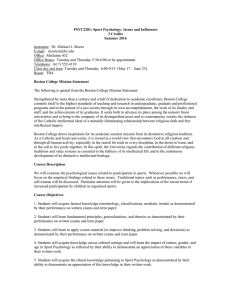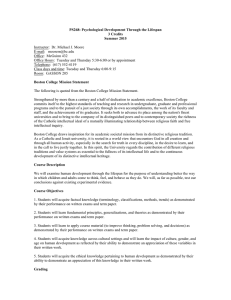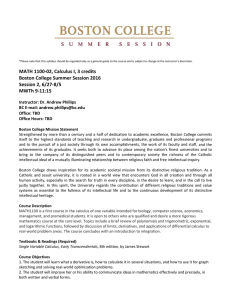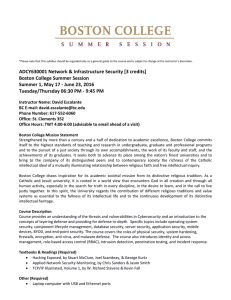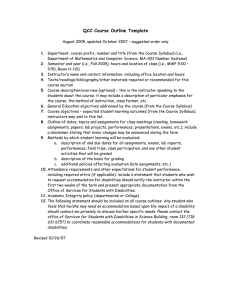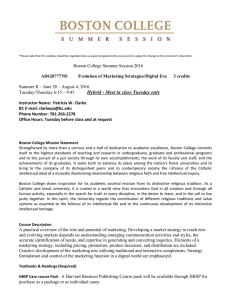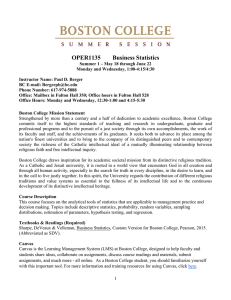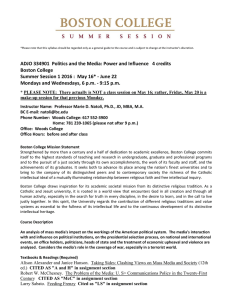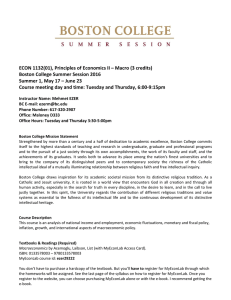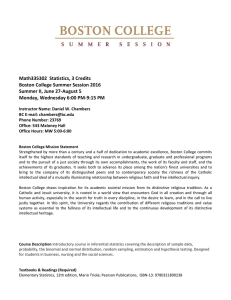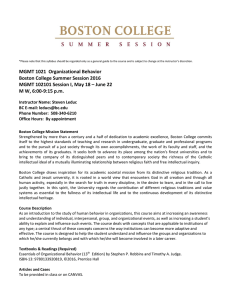Boston College Summer Session 2016 ECON113101 Principles of Economics – Micro
advertisement
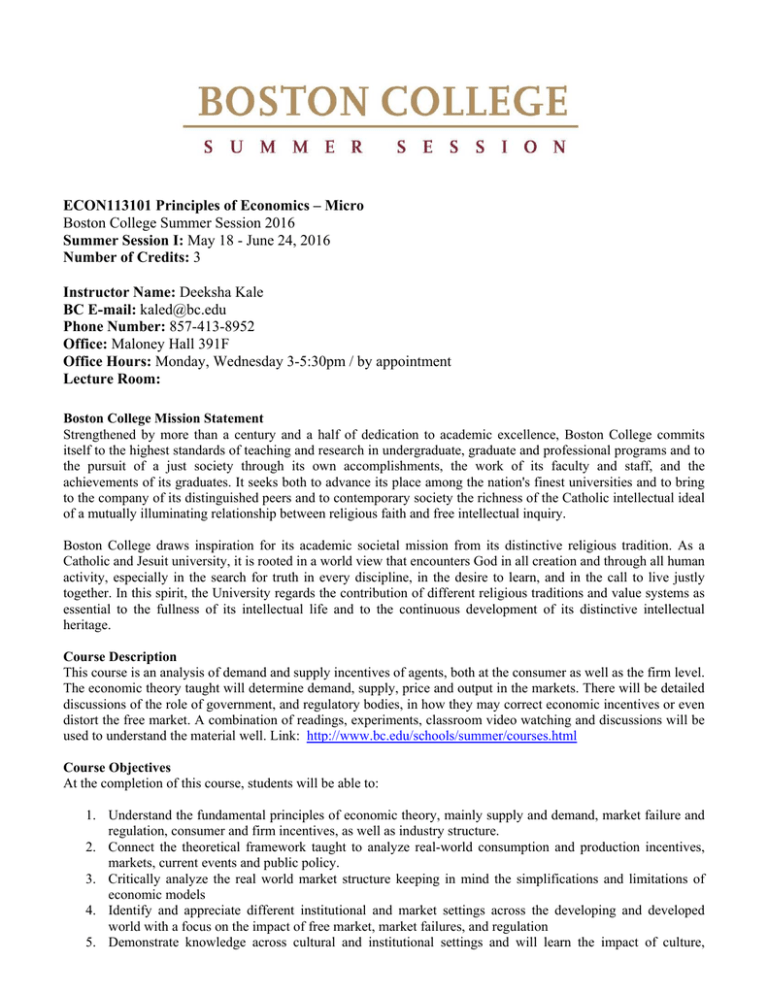
ECON113101 Principles of Economics – Micro Boston College Summer Session 2016 Summer Session I: May 18 - June 24, 2016 Number of Credits: 3 Instructor Name: Deeksha Kale BC E-mail: kaled@bc.edu Phone Number: 857-413-8952 Office: Maloney Hall 391F Office Hours: Monday, Wednesday 3-5:30pm / by appointment Lecture Room: Boston College Mission Statement Strengthened by more than a century and a half of dedication to academic excellence, Boston College commits itself to the highest standards of teaching and research in undergraduate, graduate and professional programs and to the pursuit of a just society through its own accomplishments, the work of its faculty and staff, and the achievements of its graduates. It seeks both to advance its place among the nation's finest universities and to bring to the company of its distinguished peers and to contemporary society the richness of the Catholic intellectual ideal of a mutually illuminating relationship between religious faith and free intellectual inquiry. Boston College draws inspiration for its academic societal mission from its distinctive religious tradition. As a Catholic and Jesuit university, it is rooted in a world view that encounters God in all creation and through all human activity, especially in the search for truth in every discipline, in the desire to learn, and in the call to live justly together. In this spirit, the University regards the contribution of different religious traditions and value systems as essential to the fullness of its intellectual life and to the continuous development of its distinctive intellectual heritage. Course Description This course is an analysis of demand and supply incentives of agents, both at the consumer as well as the firm level. The economic theory taught will determine demand, supply, price and output in the markets. There will be detailed discussions of the role of government, and regulatory bodies, in how they may correct economic incentives or even distort the free market. A combination of readings, experiments, classroom video watching and discussions will be used to understand the material well. Link: http://www.bc.edu/schools/summer/courses.html Course Objectives At the completion of this course, students will be able to: 1. Understand the fundamental principles of economic theory, mainly supply and demand, market failure and regulation, consumer and firm incentives, as well as industry structure. 2. Connect the theoretical framework taught to analyze real-world consumption and production incentives, markets, current events and public policy. 3. Critically analyze the real world market structure keeping in mind the simplifications and limitations of economic models 4. Identify and appreciate different institutional and market settings across the developing and developed world with a focus on the impact of free market, market failures, and regulation 5. Demonstrate knowledge across cultural and institutional settings and will learn the impact of culture, gender, and age, by analyzing the impacts of market outcomes, market failures, and public policies on the distribution of welfare across agents in the market 6. Demonstrate ethical knowledge pertaining to markets as demonstrated by qualitative discussion of desirable market outcomes and the goals of public policy Textbooks & Readings (Recommended) Texts will not be used directly in the course, but students may find them useful to help reinforce and provide alternative perspectives on the material we learn in class. Online quizzes and homework will be facilitated via MyEconLab provided by Pearson. Details regarding purchase will be discussed at the beginning of the first lecture. Main: Microeconomics, By Glenn P. Hubbard, Anthony P. O'Brien, 6th Edition + Access code to Pearson’s MyEconLab is a requirement (Quiz & HWs) Grading Your grade will be determined using the following weighting scheme. On rare occasions, this weighting may vary to reflect excused assignments, academic integrity violations, or other unusual circumstances at the instructor’s discretion. Attendance and participation Online Homework (4) Online Quizzes (4) Mid (Course) Exam Final exam 10% 20% 20% 20% 30% Class Experiments and Discussions: Every lecture after the first one will include at least one opportunity to earn class participation points through performing class exercises and responding to my questions about the exercises. Working though problem sets is an essential part of learning economics. To give you practice in working problems, I will assign a home work set and quiz every week. You may work on these problems with your study groups, but make sure you know how to do each problem just by yourself, as they are the best preparation for the exams. The undergraduate grading system for Summer Session is as follows: A (4.00), A- (3.67) B+ (3.33), B (3.00), B- (2.67) C+ (2.33), C (2.00), C- (l.67) D+ (l.33), D (l.00), D- (.67) F (.00) The graduate grading system for Summer Session is as follows: A (4.00), A- (3.67) B+ (3.33), B (3.00) B- (2.67), passing but does not count toward degree C (2.00), passing but not for degree credit F (.00) All students can access final grades through Agora after the grading deadline each semester. Transcripts are available through the Office of Student Services. Deadlines and Late Work Homework due dates will be announced periodically. Late assignments will be accepted, but the highest possible score a student can earn on the HW will fall 10% for each day that the assignment is late. No late quizzes will be accepted. Course Assignments It is expected that 8 hours per week of your study time out of class will be spent on homework assignments and quiz taking. These are listed below. Please note that some weeks will require more time and some weeks less time but the average is approximately 8 hours per week over the session. Course Schedule Date Topic Reading/Exercises and Chapter (s) May 18 May 20 May 23 May 25 Math Review, Introduction to Demand and Supply - Chapter 1, 2 The Efficiency of Market Equilibrium and Elasticity - Chapters 3, 6 Price and Quantity Control and Taxation - Chapter 4 Theory of the Firm and Cost Structures - Chapter 11 June 1 Mid (course) Exam June 6 June 8 June 13 June 15 June 20 Externalities, Environmental Policy, and Public Goods - Chapter 5 Market Structure - Perfect Competition - Chapter 12 Market Structure - Monopoly and Monopolistic Competition - Chapter 13 Oligopolies - Chapter 14 Pricing Strategy and Game Theory - Chapters 15, 16 June 22 Final Exam Important Policies http://www.bc.edu/content/bc/schools/advstudies/guide/academicinteg.html Written Work Summer Session students are expected to prepare professional, polished written work. Written materials must be typed and submitted in the format required by your instructor. Strive for a thorough yet concise style. Cite literature appropriately, using APA, MLA or CLA style per your instructor’s requirements. Develop your thoughts fully, clearly, logically and specifically. Proofread all materials to ensure the use of proper grammar, punctuation and spelling. For writing support, please contact the Connors Family Learning Center. Attendance Attending class is an important component of learning. Students are expected to attend all class sessions. When circumstances prevent a student from attending class, the student is responsible for contacting the instructor before the class meets. Students who miss class are still expected to complete all assignments and meet all deadlines. Many instructors grade for participation; if you miss class, you cannot make up participation points associated with that class. Makeup work may be assigned at the discretion of the instructor. If circumstances necessitate excessive absence from class, the student should consider withdrawing from the class. Consistent with BC’s commitment to creating a learning environment that is respectful of persons of differing backgrounds, we believe that every reasonable effort should be made to allow members of the university community to observe their religious holidays without jeopardizing their academic status. Students are responsible for reviewing course syllabi as soon as possible, and for communicating with the instructor promptly regarding any possible conflicts with observed religious holidays. Students are responsible for completing all class requirements for days missed due to conflicts with religious holidays. Accommodation and Accessibility Boston College is committed to providing accommodations to students, faculty, staff and visitors with disabilities. Specific documentation from the appropriate office is required for students seeking accommodation in Summer Session courses. Advanced notice and formal registration with the appropriate office is required to facilitate this process. There are two separate offices at BC that coordinate services for students with disabilities: ● ● The Connors Family Learning Center (CFLC) coordinates services for students with LD and ADHD. The Disabilities Services Office (DSO) coordinates services for all other disabilities. Find out more about BC’s commitment to accessibility atwww.bc.edu/sites/accessibility. Scholarship and Academic Integrity Students in Summer Session courses must produce original work and cite references appropriately. Failure to cite references is plagiarism. Academic dishonesty includes, but is not necessarily limited to, plagiarism, fabrication, facilitating academic dishonesty, cheating on exams or assignments, or submitting the same material or substantially similar material to meet the requirements of more than one course without seeking permission of all instructors concerned. Scholastic misconduct may also involve, but is not necessarily limited to, acts that violate the rights of other students, such as depriving another student of course materials or interfering with another student’s work. Please see the Boston College policy on academic integrity for more information. Request for Accommodations If you have a disability and will be requesting accommodations for this course, please register with either Dr. Kathy Duggan (dugganka@bc.edu), Associate Director, Connors Family Learning Center (learning disabilities or ADHD) or Dean Paulette Durrett, (paulette.durrett@bc.edu), Assistant Dean for students with disabilities (all other disabilities). Advance notice and appropriate documentation are required for accommodations. For further information, you can locate the disability resources on the web at http://www.bc.edu/content/bc/libraries/help/tutoring/specialservices.html
